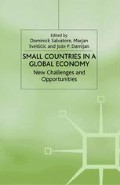Abstract
[There are three ways in which countries grow. First, by] ‘fonning a league consisting of several republics in which no one of them had preference, authority or rank above the others; and in which, when other cities were acquired, they made them constituent members in the same way as the Swiss act in our time, and as in Greece the Acheans and the Aetolians acted in olden tunes….The reason why such a republic cannot expand is that its members are distinct…which makes it difficult for them to consult and to make decisions. It means that they are less keen on acquiring dominion, for, since many communities share in that dominion, they do not appreciate further acquisition in the same way as does a single republic which hopes to enjoy the whole. Furthermore, a league is governed by a council, which must needs be slower in arriving at any decision….The second method consists in forming alliances in which you reserve to yourself the headship, the seat in which the central authority resides, and the right of mitiative. This was the method adopted by the Romans. The third method is to make other states subjects instead of allies, as the Spartans and the Athenians did…[This method] is quite useless, as can be seen in the case of the two republics just mentioned.
World Bank, ResearchDepartment, Washington, D.C. I atu thankful for comments and suggestions to Alberto Alesina, Ishac Diwan, Bill Easterly, Alan Gelb, Bartek Kaminski,Phil Keefer,LjubomirMadzar,Martha de Melo, Milic Milovanovic, Lant Pritchett, Klaus Schmidt-Hebbel, Martin Schrenk, David Tan, Francois Vaillancourt, Panos Varangis, and ChristineWallich. LeslieMohr providedvaluable research assistance. TIleviewsexpressedhere are IUy own, and maynot be attributed to the WorldBank
Access this chapter
Tax calculation will be finalised at checkout
Purchases are for personal use only
Preview
Unable to display preview. Download preview PDF.
References
ALESINA A. and RODRIK D. (1991): ‘Distributive Policies and Economic Growth’, NBER Working Paper Series, No. 3668.
ALESINA A. and SPOLOARE E. (1995): ‘On the Number and Size of Nations’, mimeo, October.
ALESINA A., PEROTTI R and SPOLAORE E. (1995),: ‘Together or separately: issues on the costs and benefits of political and fiscal unions’ European Economic Review, vol. 39, pp. 751–758.
BIRD R.M., EBEL R.D. and WALLICH CI. (1995): Decentralization of the socialist state: Integovernmental finance in transition economies, World Bank regional and sectoral studies, Washington, D.C.: World Bank.
BOLTON P. and ROLAND G.(1995): ‘The Break-up of Nations: A Political Economy Analysis’, Centre for Economic Policy Research, Discussion paper series No. 1225, London.
BUCHANAN J. (1987): ‘Economics: between predictive science and moral philosophy’, Texas A&M University series No. 7, Texas: A&M University Press.
DOYLE M.W. (1986): Empires, Ithaca, NY and London: Cornell University Press.
FREEDOM HOUSE (1994): Freedom in the World 1993–94, New York: Freedom House.
HIRSCHLEIFER J. (1991): ‘The paradox of power’ Economics and Politics, 3: 3, pp. 177–200.
HOSLI M. (1990): ‘Decision-making in the EEA and EFTA states’ sovereignty’ Aussenwirtschaft, vol. 4, pp. 463–494.
JACQUEMIN A. (1995): ‘Capitalism, competition, cooperation’ De Economist, February, pp. 1–14.
KRUGMAN P. (1991): ‘The Move Toward Free Trade Zones’ Economic Review of Federal Reserve Bank of Kansas City, November/December, pp. 5–25.
MENCINGER J. (1995): ‘Economics of disintegration (from Slovenia’s perspective)’, a paper presented at the conference on Economic cooperation in South–East Europe, Paris, June 5–9, 1995.
ORLOWSKI L. (1995): ‘Direct transfers between the Former Soviet Union Central Budget and the Republics: Past Evidence and Current Implications’ Economics of Planning, 28:1, pp.29–57.
PEROTTI R. (1992): ‘Income Distribution, Politics, and Growth’ American Economic Review Papers and Proceedings, May, p.311.
PERSSON T. and TABELLINI G. (1994): Ts Inequality Harmful for Growth?’ American Economic Review, 84:3, June, pp. 600–621.
PISSARIDES C. (1995): ‘Trade and the Returns to Human Capital in Developing Countries’, October, mimeo.
SERAGELDIN I. (1995): ‘Sustainability and the Wealth of Nations: First Steps in an Ongoing Journey’, paper presented at Third Annual World Bank Conference on Sustainable Development, September 30,1995.
SOLZHENYTSIN A. (1995): The Russian Question’ at the End of the Twentieth Century, Farrar, Straus and Giroux.
TARR D. (1994): ‘The terms-of-trade effects of moving to world prices on countries of the former Soviet Union’, Journal of Comparative Economics, 18:1, pp. 1–24.
TULLOCK G. (1991): ‘Economic integration and the future of the nation-state’, Contemporary Policy Issues, 11:2, p. 1–23.
VAUBEL R. (1994): ‘The political economy of centralization and the European community’, Public Choice, 81:1-2, p. 151.
WALLACE W. (1986): ‘What price independence? Sovereignty and interdependence in British politics’, International Affairs, Summer, pp. 367–89.
WDDGREN M. (1994): ‘Voting power in the EC decision making and the consequences of the two different enlargements’, European Economic Review, 38:5, May, pp. 1153–70.
WIDGREN M. (1994a): ‘The Relation between Voting Power and Policy Impact in the European Union’, Center for Economic Performance, London School of Economics, Working paper No. 1033, June.
Author information
Authors and Affiliations
Editor information
Editors and Affiliations
Copyright information
© 2001 Branko Milanović
About this chapter
Cite this chapter
Milanović, B. (2001). Nations, Conglomerates and Empires: Trade-off Between Income and Sovereignty. In: Salvatore, D., Svetličič, M., Damijan, J.P. (eds) Small Countries in a Global Economy. Palgrave Macmillan, London. https://doi.org/10.1057/9780230513198_2
Download citation
DOI: https://doi.org/10.1057/9780230513198_2
Publisher Name: Palgrave Macmillan, London
Print ISBN: 978-1-349-41864-0
Online ISBN: 978-0-230-51319-8
eBook Packages: Palgrave Economics & Finance CollectionEconomics and Finance (R0)

